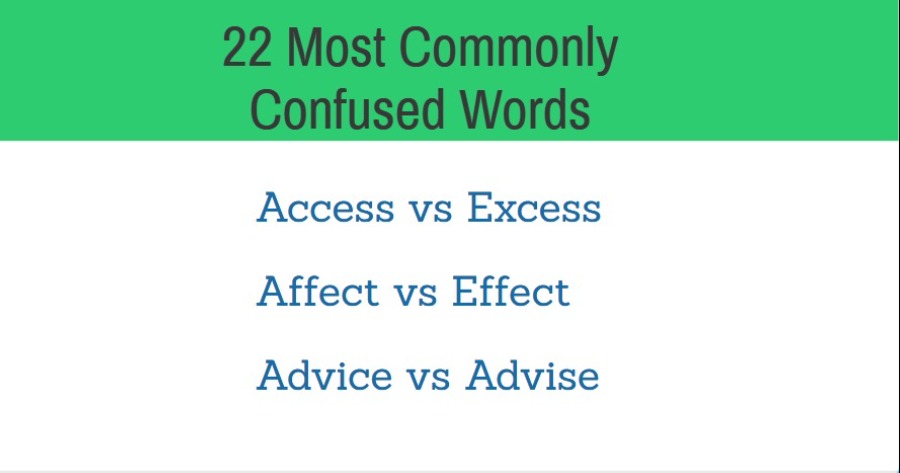English is full of confusing words that sound similar but have different spellings. In this post, we’ve provided some most commonly confused word pairs. These can help you to recognize the specific differences between different words.
22 Most Commonly Confused Words In English With Meaning
1 . Access vs Excess
- Access = to enter/ entering a place
- The cave is difficult to access.
- Excess = more than necessary
- He has an excess of anger.
2. Affect vs Effect
- Affect = to influence
- How will this change affect us?
- Effect = result
- The effect of this change will be delayed.
3. Advice vs Advise
- Advice = guidance or recommendations
- That sounds like fairly good advice.
- Advise = to recommend something
- I advised her to go home.
4. Accept vs Except
- Accept = to receive
- If you accept, please let me know.
- Except = to take or leave out
- We work every day except Friday.
5. Addition vs Edition
- Addition = to adding something
- Our baby sister is an addition to our family.
- Edition = a particular form or version
- The first edition was published in 2000.
6. Allusion vs Illusion
- Allusion = A statement that implies something without directly mentioning it
- The poem contains several allusions to this calamity.
- Illusion = a false or wrong perception of reality
- The whole thing is just a huge illusion.
7. Ascent vs Assent
- Ascent = climb
- It took only half an hour to ascent the conclusive.
- Assent = approval or agreement
- The government has given its assent to the project.
8. assure, ensure, insure
- assure = Tell someone something positively or confidently so that any doubts they may have been dispelled.
- I can assure you of its reliability.
- ensure = make certain that shall occur
- I can’t ensure his presence in time.
- Insure = Arrange for compensation in case of loss or damage
- It is wise to insure your property against windstorm damage.
9. Buy vs By
- Buy = obtain in exchange for payment.
- It took all our savings to buy the flat.
- By = by is a preposition.
- The cottage is by a river.
10. Bare vs Bear
- Bare = A person or body part that is not clothed or covered.
- How often have I told you not to go out of the house at night in your bare feet?
- Bear = to carry; to put up with
- He can’t bear the pain anymore.
11. Breath vs Breathe
- Breath (Noun) = It is the air that goes in and out of your lungs
The woman spoke almost without breathing. - Breathe (Verb) = means to exhale or inhale
Does it hurt when you breathe?
12. Beside vs Besides
- Beside = Next to
Robin sat beside John. - Besides = In addition to
Is anyone coming besides your mates?
22 Most Commonly Confused Words
13. Break vs Brake
- Break = Split, smash
You will just break my heart. - Brake = Stopping device
The brake didn’t work.
14. Quiet vs Quite
- Quiet = means silent
He was a quiet and shy man. - Quite = means very/completely/entirely
John is quite familiar with the writer.
15. Complement vs Compliment
- Complement = completes something
The flavors of the dish complement each other perfectly. - Compliment = Positive comment/ praise/ polite expression
Akmal is embarrassed by the unexpected compliment.
16. Cereal vs Serial
- Cereal = grains such as wheat, oats, or corn.
We ate a large bowl of cereal. - Serial = In a sequence
Put the questions in the same serial.
22 Most Commonly Confused Words
17. Coarse vs Course
- Coarse = Rough
He never wears clothes made of coarse things. - Course = Way/path/route/direction
Kabir teaches an undergraduate course in marketing.
18. Capitol vs Capital
- Capitol = Building: Capital means the building where the legislature meets.
The party held a rally on Capitol Hill yesterday. - Capital = City, wealth
Dhaka is the capital city of Bangladesh.
19. Censor(n) vs Sensor
- Censor = A censor is a person who suppresses an offensive subject.
The censor banned the play. - Sensor = mechanical or electronic detector
The safety device has a heat sensor that detects the presence of humans and animals.
20. Climactic vs Climatic
- Climactic = exciting or thrilling
It is a climactic scene. - Climatic = relating to climate.
The climatic situation in different parts of the world is very different.
21. Desert vs Dessert
- Desert = An area of land that is very dry
This part of the country is mostly desert. - dessert = sweet food that is eaten after a meal
This mouthwatering dessert is easy to make.
22. Elicit vs Illicit
- Elicit = to evoke or draw out
An Internet search will elicit hundreds of results. - Illicit = illegal or forbidden by rules
John had an illicit connection with Jane.
Read More:
Commonly Misspelled Words and How to Spell Them


Leave a Reply